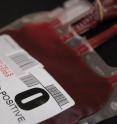Toward making 'extended blood group typing' more widely available
Scientists are reporting an advance toward enabling more blood banks to adopt so-called "extended blood group typing," which increases transfusion safety by better matching donors and recipients. Their report on a new, automated genetic method for determining a broader range of blood types appears in ACS' Analytical Chemistry, a semi-monthly journal. Christophe Marquette and colleagues explain that most blood banks still use a century-old blood approach to blood typing. It identifies blood group antigens on red blood cells -- proteins that must match in donor and recipient to avoid potentially serious transfusion reactions. Most blood currently is typed for only a few of the 29 known human blood groups, even though some rare blood groups can affect the outcome of a transfusion. Commercial technology does exist for extended typing with DNA tests. However, it is expensive, difficult to use, and suited more for research labs than high-volume blood centers, they state. Wide adoption of extended blood group typing, they note, requires a test that can handle the high volume of blood processed each year -- 14 million donations in the United States, for instance, and 20 million in Europe.
The study describes evaluation of the new more affordable method, called the HiFi Blood 96, which types blood with DNA testing in a high-speed automated procedure. Tests on 293 human blood samples demonstrated the performance and reliability of the new method. The report compares HiFi Blood 96 to existing commercial tests, and discusses improvements that are underway.
Source: American Chemical Society
Other sources
- Toward making 'extended blood group typing' more widely availablefrom Science DailyWed, 14 Jul 2010, 18:21:34 UTC
- Toward making 'extended blood group typing' more widely availablefrom PhysorgWed, 14 Jul 2010, 16:28:24 UTC
- Artificial blood developed for the battlefieldfrom PhysorgTue, 13 Jul 2010, 12:14:43 UTC
